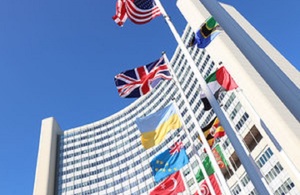UK statement on the "future role of the Committee" at the UN Committee on the Peaceful Uses of Outer Space (COPUOS)
Delivered by a member of the UK Delegation to the UN Committee on the Peaceful Uses of Outer Space (COPUOS 65) in June 2022.

UK Mission Vienna
Chair,
Please allow me to set out the view of the United Kingdom on the future role of COPUOS. As you know, the United Kingdom has taken a leading role on both the space sustainability agenda and that for space security.
COPUOS has a crucial role in ensuring the ongoing sustainability of the space environment.
It can monitor the implementation of the Guidelines for the Long-Term Sustainability of Outer Space Activities and support countries.
It can set the international framework for safe space operations, listening to member states and their academics, companies and scientists.
It can support safe and sustainable space exploration; help address climate change; discuss peaceful uses of nuclear power sources in outer space; and encourage sustainable development, including achievement of the UN Sustainable Development Goals.
And it can, and does, look for ways to set new standards, regulations and guidelines to support new activities, such as for in-situ space resource utilisation.
These should ensure the space environment can be used by all nations to support their development and their socio-economic prosperity. The UK has a proud record of global leadership on international development and the new UK International Development Strategy will help us respond to emerging innovations.
We will continue to be active in COPUOS, and in support of UNOOSA, to maintain a sustainable space environment. That includes the funding we provided for a Long-Term Sustainability project on implementation, through the UN Office for Outer Space Affairs (UNOOSA).
But one thing COPUOS cannot do is to engage in discussions about threats to space systems from States. As you know, space systems include satellites, ground infrastructure and the signals and data that flow between these. States have developed and deployed weapons to target these space systems and to threaten the security of States.
But discussion of weapons is for the UN disarmament structures. COPUOS should not blur the lines with the disarmament community.
So the United Kingdom will continue to engage actively in discussions under the agenda item of Preventing an Arms Race in Outer Space at the Conference on Disarmament and the UN Disarmament Commission. We were delighted to attend the first meeting of the Open Ended Working Group in May, established through our UNGA resolution on “Reducing Space threats through norms, rules and principles of responsible behaviour” at the UN General Assembly First Committee in 2021. We remain convinced that the focus of the OEWG on responsible behaviours is a promising avenue for the prevention of an arms race in outer space.
Chair, let us not confuse these two very different strands of work and forums. One, COPUOS, looks to maintain space for all nations to use. The other, UN disarmament, seeks to prevent escalation and conflict that could arise from the use of weapons against space systems. They need to be dealt with separately.
Discussions on space security belong in the Conference on Disarmament plus the UN First Committee and its newly established open-ended working group on reducing space threats through norms, rules and principles of responsible behaviours.
Finally Chair, the UK believes that COPUOS should continue to be agile and receptive to the increasing number of actors in outer space. To ensure that the development of the global governance of outer space is transparent, COPUOS should consider new and novel ways to best engage relevant stakeholders, such as industry, academia and civil society actors, in our joint endeavours.
Thank you.